Key Insights
- Decentralized Physical Infrastructure Networks (DePIN), such as Pocket Network, are becoming more critical for Web3 protocols seeking a decentralized technology stack instead of relying on centralized Web2 cloud service providers.
- Pocket DAO’s governance structure presents a unique case study in protocol governance. Despite only minting 55 governance tokens to date, Pocket DAO governance remains exceptionally active, with more than 50% engagement on some of the DAOs most recent votes.
- A proof-of-participation model creates a uniquely flat power dynamic in DAO governance and contributes to a strong technical foundation, which may allow the DAO to explore new primitives in on-chain identity and governance.
Background
Approximately 55% of the Internet runs on Amazon Web Services (AWS) and Microsoft Azure. If these two centralized cloud service providers went offline, more than half of the Internet would go offline. Sure, this is currently a theoretical Y2K scenario. However, the Internet’s overreliance on these two centralized service providers has created growing importance for Decentralized Physical Infrastructure Networks (DePIN) such as Pocket Network.
Pocket Network is an easy-to-integrate multi-chain protocol that relays an app’s Remote Procedure Calls (RPCs) to a network of RPC nodes for any blockchain, making it a solution to the node centralization problem for any Web3 protocol that desires to be fully decentralized.
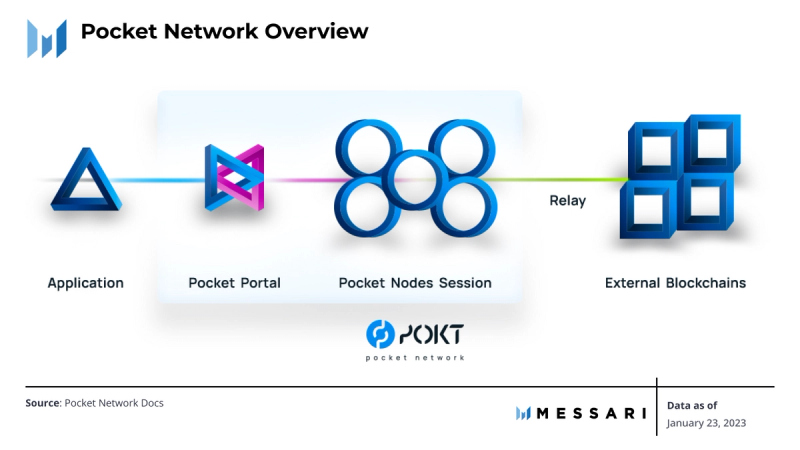
The Pocket Network Foundation (PNF) has stated its mission is to grow Pocket Network into a hyperstructure, a “new category of public good infrastructure that is non-extractive, unstoppable, permissionless, and thus creates positive-sum value for all participants.” A key aspect of the hyperstructure framework is to balance ownership and governance by providing “ownership where possible and governance where only absolutely necessary. Too much of either and hyperstructures get skewed incentives, or are at risk of attack.” Thus, Pocket Network has been utilizing the governance powers of Pocket DAO to build the Pocket Network into a hyperstructure.
Governance Structure
Pocket DAO has adopted a governance structure inspired by the tripartite separation of powers:
- Legislative: Pocket Network Council (PNC)
- Executive: Pocket Network Foundation (PNF)
- Judiciary: Pocket Network validators
The PNF is responsible for executing the Pocket DAO’s executive functions for the PNC. When the PNC approves a Snapshot proposal to upgrade the protocol, change a parameter value, or transfer funds from the DAO treasury, the PNF must execute these governance transactions on the DAO’s behalf. The validators of Pocket Network then have the ultimate power to accept or reject these governance transactions.
The PNF’s objectives are to be stewards of the Pocket Network, hold legal custodianship of Pocket Core, and request funds from the PNC for specific projects that have strategic value to the Pocket Network ecosystem by submitting Pocket Ecosystem Proposals (PEPs).
Recently, PIP 26 successfully amended the PNF’s structure to transition Jack Laing’s governance team from Pocket Network Inc. (PNI) to the PNF – and appoint new independent talent – to ensure the PNF can evolve into a more active entity that will improve support and coordinate of a fair Pocket Network ecosystem for all stakeholders.
PNI is the core software developer contracted by the PNF on behalf of the Pocket DAO to review and approve protocol upgrades.
PNC consists of POKTDAO token holders and is responsible for Pocket DAO’s legislative duties. To obtain a POKTDAO voting token, one must reach the corresponding level in the POKT Arcade community onboarding game and be verified as human by the existing PNC members.
Pocket DAO utilizes a proof-of-participation mechanism for its voter application process. Four paths allow a person to earn trophies and a POKTDAO token in the POKT Arcade community onboarding game:
Once a path is chosen, the following four steps must be completed:
- Step 1: Each path has three levels. Once a person reaches the second level, they must complete the Pocket Network’s anti-Sybil mechanism by posting a selfie, username, and date on the Pocket Network Discord.
- Step 2: In the same Discord channel, the person will need to respond to the following two prompts:
- “My favorite thing about Pocket Network is.”
- “Why I want to be a voter.”
- Step 3: A minimum of 33% of the existing POKTDAO voters must approve the voter submission within seven days of the post, allowing existing members to veto applicants viewed as malicious agents.
- Step 4: Once the person has the Qualified and Verified Discord roles, they can claim their POKTDAO token airdrop in the Discord by direct messaging jackal (Jack Laing).
After completing these four steps, the new POKTDAO tokenholder will be allowed to vote on Pocket DAO Snapshot votes.
Governance Process
The Pocket Network governance process consists of three phases:
- Preliminary discussion
- Off-chain voting
- Implementation
The preliminary discussion phase allows anyone to discuss a proposal idea on the Pocket Network Forum. The forum is a formal platform for Pocket Network community members to debate the merits of each proposal. Forum moderators may only edit proposals to assign proposal numbers, categorize proposals appropriately, and update the status of proposals.
Pocket DAO has three proposal types:
- Pocket Improvement Proposal (PIP): PIPs level up the Pocket Network ecosystem by upgrading the protocol, upgrading the DAO governance or PNF, or adding/removing permission holders within the existing governance structure of the DAO.
- Pocket Ecosystem Proposal (PEP): PEPs distribute funds or form agreements with contributors to the Pocket Network ecosystem via imbursements, reimbursements, bounties, transfers, and agreements.
- Parameter Update Proposal (PUP): PUPs modify protocol parameters.
PNC (POKTDAO tokenholders) are the only people allowed to participate in off-chain voting. PIP, PEP, and PUP votes must last seven days and pass with majority approval (over 50% yes votes by participating voters) unless otherwise specified in the Constitution.
Voter Analysis
The Pocket Network’s unique governance structure lends itself to an equally unique set of data points. For example, most DAOs are hyper-focused on raising growth and participation. However, at Pocket DAO, only 55 POKTDAO governance tokens have been minted to date. While the DAO governance remains exceptionally active, the DAO’s onboarding has largely stagnated, and the DAO has hardly minted POKTDAO tokens over the past few months.
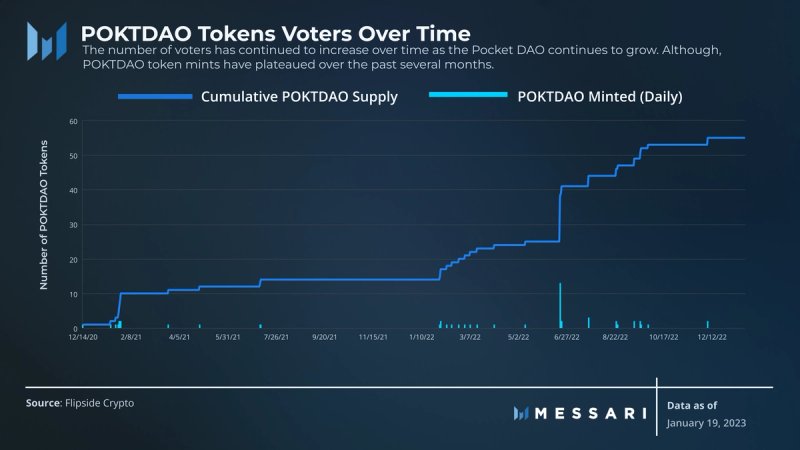
The limited supply is partly by design. One of the most significant roadblocks to one-person-one-vote is the Sybil problem, which arises when a single entity can create multiple identities to manipulate the outcome of a network’s decision-making.
Pocket DAO has opted to fight the Sybil problem by introducing proof-of-participation friction. This friction ensures prospective DAO members demonstrate skin in the game by completing any of the four proof-of-participation paths.
Despite being unable to verify that no Sybil attacks have occurred, voters’ growth rate in Pocket DAO appears non-indicative of Sybil attacks recognized in other DAOs. However, this is not to say that misaligned actors will not test Pocket DAO’s Sybil resistance in the future.
Pocket DAO’s power dynamics also create a deflationary effect on a single voter’s influence. As more members join the DAO, each voter’s influence decreases. In theory, this dynamic could deter existing voters from empowering new voters as their share of voting power slips with each new POKTDAO holder.
Concerning governance tokens, often, when calculating each wallet’s executed voting power (an individual’s executed voting power divided by the DAO’s total exercised voting power), the governance influence of whales reveals their highly disproportionate power over historic votes. For example, in our 2022 Optimism governance report, it was discovered some delegates held up to 15% of the total executed VP to date. In contrast, in Pocket DAO’s egalitarian governance, the highest percentage of voting power executed over all Pocket DAO votes to date is 6.72% from voter 0xc009…75FD.
Impressively, participation in Pocket DAO has continued to increase despite the slowing on-ramp of new DAO members. With only 55 POKTDAO tokens minted, the fact that the DAO has attracted over 50% participation on more than one occasion is noteworthy.
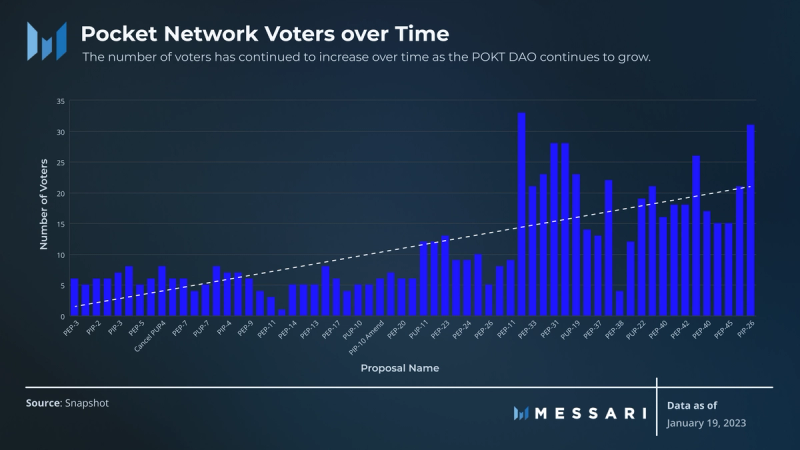
Despite Pocket DAO’s relatively small voter base, many votes remain under serious contention. For example, several proposals over the past six months faced profound opposition.
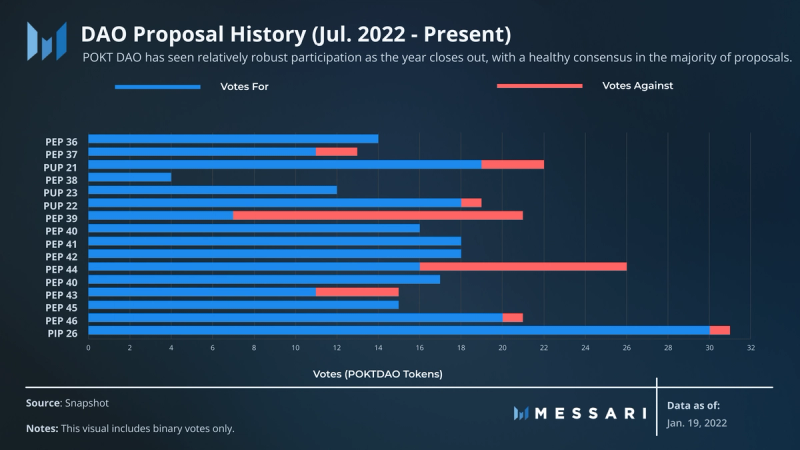
The Pocket Network forum remains exceptionally active, with numerous community members actively participating in proposal discussions. The following graphic demonstrates a snapshot of some of the most active forum posts. Despite the limited number of Pocket DAO voters, the community appears active and engaged.

Governance Trends
The Pocket Network has continuously pushed itself to experiment with new governance mechanics and DAO operation design for community access, efficiency, and values. A few proposals over the past six months have embodied these design goals:
Get a GRIP (PEP 45):
This proposal established a team of technical and economic specialists, editors, and graphic artists to help streamline and amend the proposal process over three months. The new GRIP team serves as a technical steward for new ideas from DAO contributors and as a communicator of a proposal’s potential impact. Given Pocket Network’s unique one-person-one-vote structure, the GRIP team aims to increase accessibility to governance for all DAO members and increase participation. Dermot and Jack Laing supported the proposal and expressed reservations about moving governance approval into “backchannels.”
Foundation for the Future (PIP 26):
This aforementioned proposal formally restructured the DAOs operational structure and formal documentation. It also provided valuable insight into the DAOs future priorities, highlighting the long-term vision for on-chain governance, the automation of trophies and vote claiming, new social ware to support contributors and the launch of a formal Grants program.
Governance Analysis
Pocket DAO is focused on building a fair and egalitarian DAO that avoids plutocracy. Many DAOs currently have a plutocracy due to token-weighted voting leading to only core contributors and large token holders, whales, controlling all of the DAO’s governance votes.
Although imperfect, the Gini coefficient provides insight into the level of equality in a DAO by measuring the distribution of tokens, or wealth, in a DAO. The smaller the number is out of 1, the more evenly the tokens are distributed. For Pocket DAO, there are currently 55 POKTDAO tokenholders that can hold a maximum of one POKTDAO token and carries the voting power of one vote. Therefore, Pocket DAO has a Gini coefficient of 0. A Gini coefficient of 0 is an outlier compared to all other DAOs, such as Optimism, which has a 0.6 Gini coefficient among its Optimism delegates.
Intrinsic Value
Despite only having 55 voting members, Pocket DAO’s forum engagement rivals some of the largest and most well-known DAOs, such as Aave, Balancer, and Uniswap.
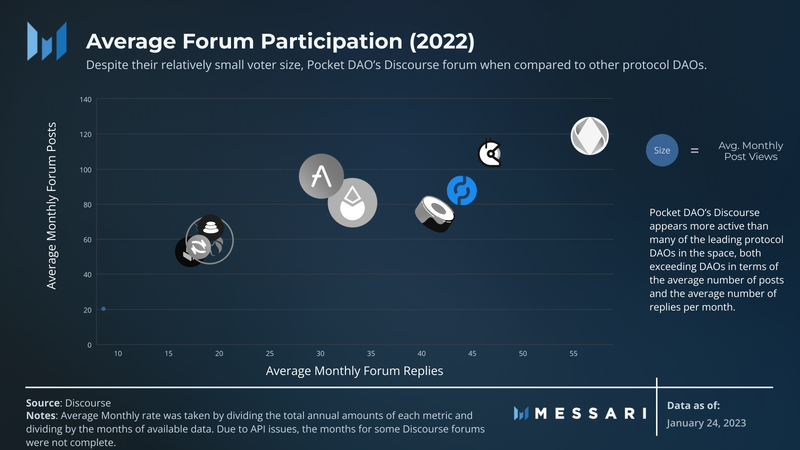
Pocket DAO has a fraction of the voters as these DAOs. Yet, Pocket DAO’s forum engagement ranks highly compared to many DAOs with larger voting populations.

One explanation could be that the Pocket DAO voters are putting an intrinsic value on their governance voting power, given they earned their token through the proof-of-participation onboarding process.
Comparatively, the voters of token-weighted voting DAOs inherently value their governance voting power less because their governance tokens were likely either bought on the open market, unvested, airdropped, or delegated to their respective voters. This suggests that Pocket Network’s proof-of-participation onboarding system may demonstrate one solution to reducing voter apathy.
Unique Opportunities
By Pocket DAO’s Gini coefficient of 0 confirming its goal of avoiding plutocracy, the Pocket DAO stands out as a protocol DAO utilizing a system to earn governance tokens to govern its protocol instead of token-weighted voting using its native protocol token, POKT. The DAO is pushing boundaries and exploring new approaches. It’s also positioning itself to take advantage of meaningful primitives in DAO governance.
Identity and Data
The proof-of-participation model is a clever fix to the Sybil problem. However, a gamified trophy system also lays the groundwork for meaningful insights into DAO and contributor activity.
The proof-of-participation model can enable Pocket DAO to leverage greater data availability and improve the DAO’s transparency and accountability. The collection and utilization of DAO data have been a massive challenge for DAOs. The problem is multifaceted, from farming governance engagement to DAO contributor compensation transparency. A lack of DAO data can be attributed to DAOs being in their infancy. Balancing decentralization and operational efficiency is a tall task. The lack of mature crypto-native tools means most DAOs coordinate across a smorgasbord of Discord, Discourse, Snapshot, and Telegram, making it difficult to track member contributions.
As an organization, the design of POKT Network’s governance approach to governance power creates a flatter organization (by enabling Sybil-resistant one-person, one-vote dynamics). However, it also lays a technical foundation for increased modularity and governance availability.
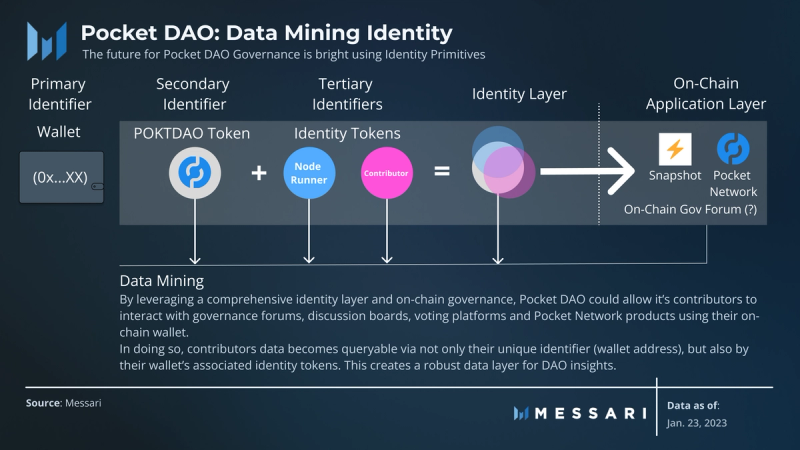
By providing additional soulbound “Trophy” tokens, the organization can build a robust identity layer and collect granular data on contributor behavior. Jack Laing, the Executive Director of the Pocket Network Foundation, appears interested in further building on-chain verifiable credentials and identity tokens. These identity layers can help solve data availability issues and enable greater insights into DAO contributions. This includes how certain factions might participate, vote, and express their interests across the DAO’s layers of governance. While these are solutions of tomorrow, it is refreshing to see a DAO commit to the technical foundation for these solutions today.
Gamified Governance
The gamified trophy system, and the increased data availability through identity layers, allow for new governance feedback loops and rewards for active governance contribution. For example, Pocket DAO could reward contributors that have completed all of the trophy paths by minting them an additional POKTDAO token. Ultimately, this rewards contributors who have demonstrated a high commitment to learning about all aspects of the Pocket DAO.
Rewarding fully committed contributors would not break the egalitarian power dynamics of Pocket DAO. Instead, it will incentivize contributors to increase their Pocket Network knowledge base by completing relevant actions in the trophy system. More contributors with a greater Pocket DAO knowledge base would benefit the DAO by leading to a higher-quality decision-making process from the PNC.
Conclusion
The PNF has demonstrated great commitment to building the Pocket Network into a hyperstructure that finds the balance of ownership and governance through a unique governance structure, governance process, and addition of the GRIP team in PEP 45, all while keeping Sybil-resistance in mind.
Further, the Pocket DAO has demonstrated impressive engagement, proving a small but mighty DAO can stand out across various decentralization and operational metrics. The greater Pocket Network organization can conduct experiments by introducing identity layers for improved data availability and gamified governance incentives, ensuring it is a DAO worth watching in years ahead.



















